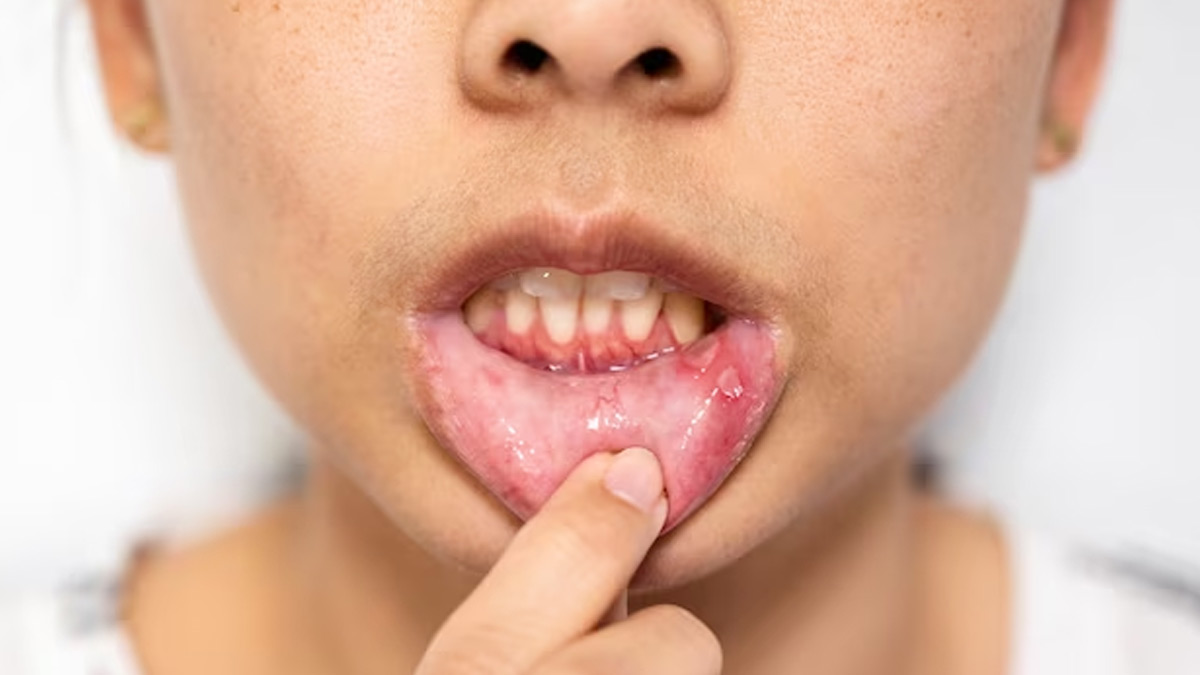
Mouth ulcers are common oral health issues people often experience. Mouth ulcers can also cause pain, which makes some people take it as oral cancer. While in some cases, a mouth ulcer can be a sign of oral cancer, but not all mouth ulcers are cancerous. To know more about it, we spoke to Dr Kanury Rao, Chief Scientific Officer and Co-Founder - PredOmix. He also works as an Indian Immunologist and Head of the Drug Discovery Research Centre at Translational Health Science and Technology Institute Faridabad.
Table of Content:-
Differentiating Between Mouth Ulcer And Oral Cancer
According to Dr Rao, "Mouth ulcers, also referred to as oral ulcers or canker sores, are painful lesions that manifest within the oral cavity. They commonly appear on the tongue, inside the cheeks, gums, or lips."
"It involves the development of round or oval-shaped sores with a white or yellowish-grey centre surrounded by a red border," added Dr Rao. He said that patients may experience varying degrees of pain, ranging from mild to severe discomfort, making activities like eating, drinking, and speaking challenging. Some individuals may also report a burning or tingling sensation before ulcer formation.
Causes of Mouth Ulcers
The doctor said that the cause of mouth ulcers remains somewhat elusive, although several contributing factors have been identified. "Trauma or injury to the oral mucosa resulting from accidental biting, vigorous tooth brushing, or the use of sharp objects can initiate ulcer formation," added Dr Rao.

Also Read: Expert Explains Causes And Treatment Of Mouth Ulcers In Children
He said that infections caused by viruses, such as herpes simplex virus or bacteria, such as Helicobacter pylori have also been associated with mouth ulcers. "Certain autoimmune disorders including Behcet's disease, lupus, and Inflammatory Bowel Diseases (IBS) are associated with an increased propensity to developing mouth ulcers," said Dr Rao.
"Nutritional deficiencies, particularly of essential nutrients like vitamin B12, iron, zinc, or folic acid, have been linked to their occurrence," said the doctor. He added that hormonal fluctuations, notably during the menstrual cycle, can provoke mouth ulcers in some women. Additionally, allergic reactions to some foods like almonds, dental materials, or oral care products can serve as triggering factors in susceptible individuals.
What is Oral Cancer?
Dr Rao said, "Oral cancer, medically known as malignancy of the oral cavity, encloses the abnormal growth of malignant cells within the tissues of the mouth, including the lips, tongue, cheeks, floor of the mouth, and throat."
He added that oral cancer can arise from various factors, such as tobacco and alcohol use, prolonged exposure of the lips to sunlight, viral infections (particularly Human Papillomavirus), immunocompromised states, poor oral hygiene, and a family history of cancer.
Dr Rao said, "Oral cancer may manifest as persistent mouth sores or ulcers that do not heal, lumps or thickened areas in the oral tissues, reddish or whitish patches in the mouth, pain or discomfort while speaking or swallowing, persistent hoarseness, unexplained bleeding in the mouth, numbness or pain in the face or mouth, and changes in the fit of dentures."

Also Read: Can Poor Oral Hygiene Increase The Incidence Of Oral Cancer? Expert Explains
The management of oral cancer typically entails a multimodal approach involving surgical intervention, radiation therapy, and chemotherapy. Dr Rao said, "Surgical procedures aim to excise the tumour and affected tissues, while radiation therapy employs high-energy X-rays to eliminate cancer cells. Chemotherapy utilises medications to eradicate or impede the growth of cancer cells."
"Rehabilitation therapies, including speech therapy and dietary counselling, may be employed to restore normal functions following treatment," said the doctor.
Bottomline
Dr Rao said, “It is important to note that only a medical specialist can provide an accurate diagnosis to you.” “If you have concerns about a persistent sore or ulcer in the mouth, it is advisable to seek prompt medical evaluation for a thorough diagnosis, which may include a biopsy or other diagnostic tests, to differentiate between a mouth ulcer and oral cancer,” he added.
[Disclaimer: The information in this article is provided by a registered dietician. However, we recommend you consult your healthcare provider for a diet plan as per your body's requirements.]
Also watch this video
How we keep this article up to date:
We work with experts and keep a close eye on the latest in health and wellness. Whenever there is a new research or helpful information, we update our articles with accurate and useful advice.
Current Version
